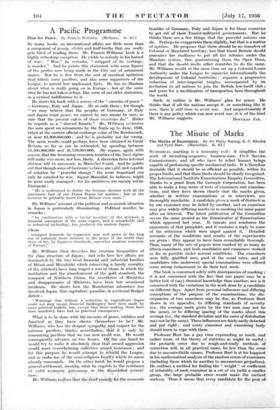A Pacific Programme Plan for Peace. By Francis Williams. (Methuen.
38. 6d.)
So -many books on -international affairs are little more than a compound of gossip, clichés and half-truths that one really gets tired of reading them. Mr. Francis Williams' book is a highly refreshing exception. He yields to nobody in his hatred of war : " War," he remarks, " stripped of its verbiage, is murder." And he points this statement with some figures of the profits now being made in the City out of armament shares. But he is free from the sort of mystical optimism that blinds some pacifists, and also some supporters of the League, to patent but unpleasant facts. He has no illusions about what is really going on in Europe ; but at the same time he has not taken refuge, like some of our elder statesmen, in a cynical indifference to it.
He starts his book with a survey of the " enemies of peace " —Germany, Italy and Japan. He so calls them ; for though " we may believe that the peoples of Germany, of Italy and Japan want peace, we cannot by any means be sure, so sure that the present rulers of these countries do." Hitler he regards as a " shrewd fanatic." Mr. Williams estimates the sum spent on armaments by the Nazis up to June, 1938, taken at the current official exchange value of the Reichsmark, at near £2,300,000,000 ; and he is probably not far wrong.
The same results could perhaps have been obtained in Great Britain, so far as can be estimated, by spending between
£1,500,000,000 and £1,750,000,000. He argues, again with reason, that the increasing economic troubles of the Nazi regime- will make war more, not less, likely. A diversion from internal
distress will be necessary, as Mussolini found. And he points out that though some of Germany's claims are valid and capable of solution by " peaceful change," the more important can only be satisfied by war. Signor Mussolini, he believes, might be more easily managed : for his ambitions are mainly extra- European :
" He is understood to dislike the German dictator with all the passionate fury of one Prima Donna for another ; but at the moment he probably hates Great Britain even more."
Mr. Williams' account of the political and economic situation in' Japan is particularly illuminating. Political murder, he remarks :
" In combination with a family morality of the strictest, a financial conception of the most expert, and a remarkable skill in industrial technology, has produced the modern Japan," •
whose
" insurgent demands for expansion may well prove in the long run of infinitely more moment to the peace of the world' than those of the, by Japanese standards, somewhat amateur terrorists of Europe."
lir. Williams then describes the extreme inequalities of the class structure of Japan ; and tells how her affairs are dominated by the two rival financial and industrial families of Mitsui and Mitsubishi which (observing a family morality of the strictest) have long waged a war of titans in which the institution and the abandonment of the gold standard, the conquest of Northern Chinn; the overthiCw of Ministries and disappearance of Ministers, have been but occasional incidents. He shows how the Manchurian adventure has involved Japan, that capitalists'- paradise, in a colossal Budget deficit :
" Warnings that without a reduction in expenditure Japan could not long escape financial- bankruptcy' have been made by some political leaders', but, except that those making them have been murdered, have had no practical consequence."
What is to be done with the enemies of peace, ruthless and fanatical as they have shown themselves to be ? Mr. Williams, who has the deepest sympathy and respect for the extreme pacifists, thinks, nevertheless; tht it is only by
renouncing pacifism that we can now avoid war. He would consequently advance on two fronts. Off :the one hand he would try to make it absolutely clear th-aT armed aggression
would meet overwhelming collective arni,ed, resistance ; and for this purpose he would attempt to rebirild the League, and so make use of the semi-religious loyalty which its name already commands. On the other hand,' he "Would propose a
general settlement, meeting what he regard; Us the resistance of valid economic. grjeyancoqs . in the. dis,satjsfied powers'
case.
Mr. Williams realises. that the chief remedy for the economic
troubles of Germany, Italy and Ji-pan is for those countries to get rid of their Fascist-militarist governments. But he thinks there are a few things that the peaceful nations can do. Perhaps he exaggerates them slightly, but that is a matter. of opinion. He proposes that there should be no transfers of Colonial or Mandated territory, but that Great Britain should, announce her readiness to put all her colonies under the Mandate system, thus guaranteeing them the Open Door, and that she should- invite other countries to do the same. Mr. Williams would at the same time set up a Colonial Loans Authority under the League to supervise internationally the development of Colonial territories ; organise a progressive reduction of inter-imperial tangles, accompanied ' by an invitation to all nations to join the British low-tariff club ; and press for a modification of immigration. laws throughout the world.
Such, in outline is Mr. Williams' plan for peace. He, thinks that if all the nations accept it, or something like it now, there is still time to avert war. And unquestionably if there is any policy which can now avert war, it is of the kind














































 Previous page
Previous page